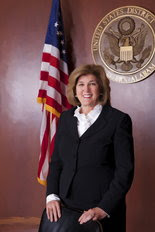In the latest ruling, a Birmingham federal judge this afternoon again upheld most sections of Alabama's tough new immigration law.
 |
| U.S. District Judge Sharon Lovelace Blackburn |
Blackburn did block the state from barring illegal immigrants from enrolling in public universities.
In the lawsuit filed by the Hispanic Interest Coaltion of Alabama and others, Blackburn also stopped the state from enforcing two new traffic laws, which would have set up $500 fines for blocking traffic to hire workers on a street.
But she let most other sections of the 72-page law take effect.
Earlier today, in her ruling on the lawsuit filed by the U.S. Department of Justice, Blackburn refused to block a provision of the state law related to police stops and detentions of people suspected of being in the country illegally.
Similar laws in Arizona and Georgia had been blocked by other federal judges, but in her 115-page order, Blackburn disagreed with those rulings. She determined Congress has not prevented states from playing a role in immigration enforcement.
She also declined to block sections requiring schools to check the citizenship status of children and sections that would nullify contracts knowingly entered into with unauthorized aliens.
Blackburn refused to block a section making it a felony for "an alien not lawfully present in the United States" to apply for a license plate, driver's license, business license or other business license.
Blackburn agreed with the Department of Justice on just four portions of its legal challenge. Blackburn ruled the state:
» Can't stop an "unauthorized alien" from seeking work as an employee or independent contractor.
» Can't prosecute those who assist unauthorized aliens. She blocked a large section that would make it against the law to conceal, harbor, transport or encourage an illegal alien to stay in Alabama. This includes portions of the law referring to landlords.
» Can't stop businesses from deducting the wages they pay to unauthorized aliens from their state taxes.
» Can't create a new protected class of workers. The new law would have allowed workers who were fired or not hired in favor of unauthorized aliens to sue employers for discrimination.
Most aspects of the law were set to go into effect Sept. 1. But in late August Blackburn issued a temporary injunction. She gave herself until today to rule on the three challenges brought by the U.S. Department of Justice, by leaders of Alabama's Catholic, Episcopal and United Methodist churches, and by a roster of civil rights groups, unions and service organizations. Immigration measures passed in Arizona, Georgia, Indiana and Utah have been blocked by the federal courts. Supporters of the Arizona law are asking the U.S. Supreme Court to take the case.
Alabama's law goes further than the other state measures and seeks to "attack every area of an illegal alien's life," according to the measure's chief sponsor, Alabama Rep. Micky Hammon, R-Decatur.
The far-reaching measure was passed this spring by Alabama's first Republican-led Legislature in more than 140 years. It includes an array of criminal and civil penalties for illegal immigrants found in Alabama and those who work with or assist them.
Legislators and attorneys for Alabama have argued the federal government has not done enough to enforce immigration law and has essentially forced Alabama to act to protect the state's economy. Alabama legislators stressed that in passing the law, they were delivering on a campaign promise.
The U.S. Justice Department has argued the law usurps the federal government's constitutionally defined role in regulating immigration. The lawsuits argue Alabama's law will lead to racial profiling, unlawful searches and detention and violations of constitutional protections of due process and equal protection.
In a third suit filed by Alabama religious leaders from the Catholic, Episcopal and United Methodist churches, the judge refused to block a ban on contracts. She did block the state from criminalizing the harboring, transporting and encouraging of illegal immigrants, a key concern of religious leaders.
No comments:
Post a Comment